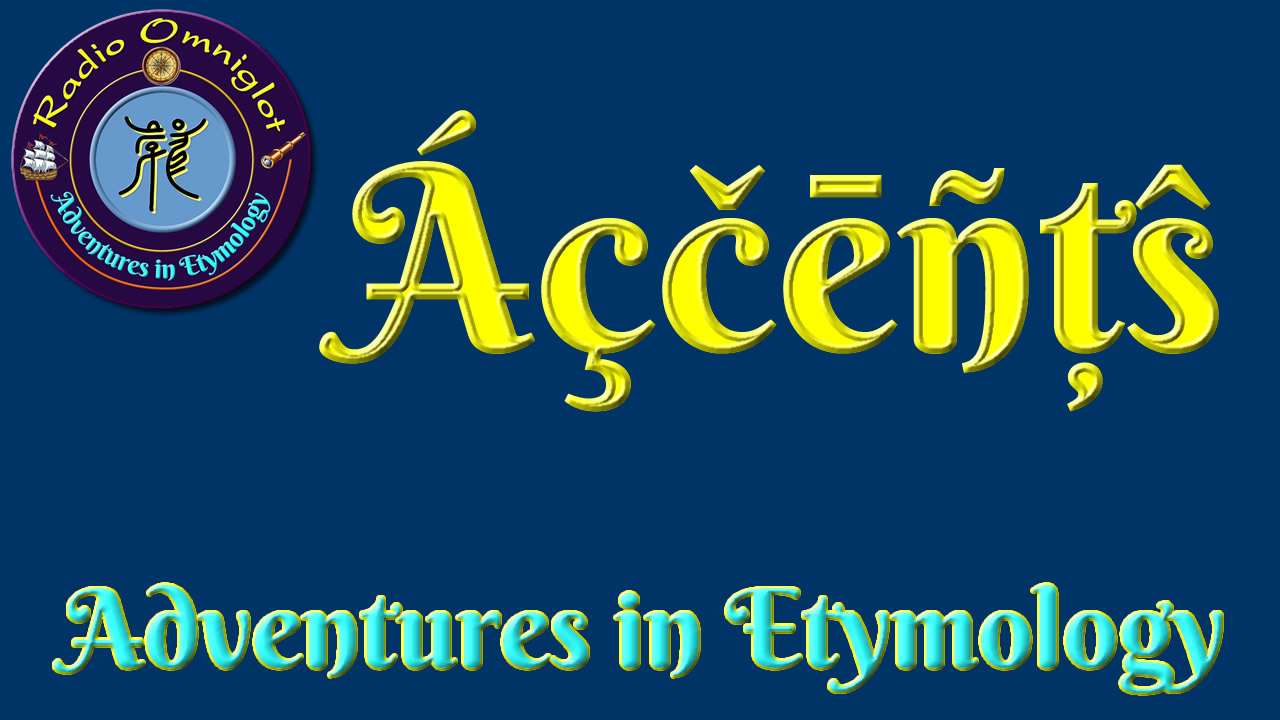Podcast: Play in new window | Download
In this Adventure in Etymology, we find what the word accent has to do with singing.

An accent [ˈak.sənt / ˈæk.sɛnt] is:
- The way in which people in a particular area, country, or social group pronounce words.
- A mark written or printed over a letter to show how to pronounce it.
- A special emphasis given to a particular syllable in a word, word in a sentence, or note in a set of musical notes. [source – other meanings are available]
It comes from Middle English accent (accent, modulation), from Latin accentus (a blast, signal, accent, tone), from accinō / accanō (to sing to), from ad (to[wards]), and canō (to sing, recite, sound), a calque of Ancient Greek προσῳδία (prosōidía – song sung to music; pronunciation of syllable), from πρός (prós – to) and ᾠδή (ōidḗ – song) [source].
Words for accent in many other languages come from the same roots, as do the words chant, descant, enchant, incant and hen in English, canu (to sing, intone, chant) in Welsh, can (to say) in Scottish Gaelic, cicogna (stork) in Spanish, káně (buzzard) in Czech, and خوانْدَن (xândan – to read, recite, sing, study) in Persian [source].
Incidentally, the Ancient Greek word προσῳδία (prosōidía – song sung to music; pronunciation of syllable) is the root (via Middle French and Latin) of the English word prosody, which is study of rhythm, intonation, stress, and related attributes in speech, or the study of the patterns of sounds and rhythms in poetry [source].
You might believe that you don’t have an accent, but you do. We all do. You might think that because you sound similar to most people around you, you don’t have an accent, while people from elsewhere do. From their perspective, it’s you that has an accent. I have a bit of a wandering accent that changes depending on who I’ve been listening and/or talking to.
You can also listen to this podcast on: Apple Podcasts, Amazon Music, TuneIn, Podchaser, Podbay or Podtail and other pod places.
If you would like to support this podcast, you can make a donation via PayPal or Patreon, or contribute to Omniglot in other ways.
Radio Omniglot podcasts are brought to you in association with Blubrry Podcast Hosting, a great place to host your podcasts. Get your first month free with the promo code omniglot.
I also write about words, etymology and other language-related topics on the Omniglot Blog, and I explore etymological connections between Celtic languages on the Celtiadur blog.


In a broader sense, we can say: each speaker has his or her own ‘idiolect’ (including individual accent).
Simon, you remarks about accents made me smile. I have (up until now) believed that Michigan people (Michiganders) were the only ones that spoke English without an accent. The reason I felt that way is when I hear TV shows or news broadcasts, they always sounded like I do. Since then, I have been shown how I actually do have an accent. It’s hard to come up with examples, but when I say “up north” to refer to northern Michigan, I say it kind of like “up NAARTH” or something. There’s a few more examples. The New York Times once had an interactive web page, where you could describe how you pronounced a special list of 20-some words, and once you took this test, they could pinpoint where you lived. They got my location right, within about 20 miles or so. It was a real eye-opener.